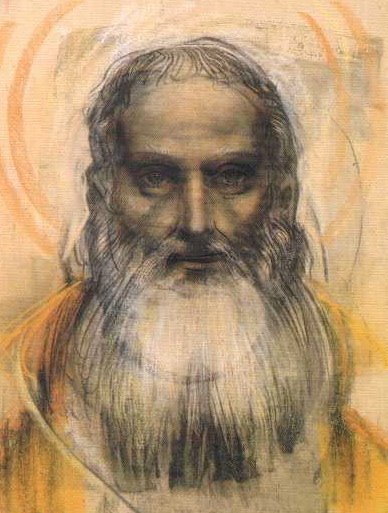I promised a Benedictine online retreat for Lent. I’ve been very busy this week, so this is a little late, but here is part two:
This is an excerpt from chapter two my book St Benedict and St Therese-The Little Rule and the Little Way. The full chapter is posted here in the Suburban Hermit section of the blog for Donor-Subscribers. The new second edition of the book is available from the website bookstore here:
In his final chapter Benedict says his rule is ‘a little rule for beginners.’ At first this sounds like the false modesty of the great man of letters. ‘You have written a masterpiece!’ says the fawning devotee. With a superior wave of the hand the guru says, ‘It is nothing. A few scribblings, a little rule for beginners, that is all.’ In one sniff he has elevated himself and relegated his readers to mere beginners. If his attitude were so self-righteous then he has made an accurate assessment of his book. It is indeed nothing. But Benedict’s rule is not nothing and he could never be accused of such spiritual pride. Everything else in his writings, his life and his reputation belie such an interpretation. Perhaps then, when he calls his masterpiece ‘a little rule for beginners’ he is simply being modest. He knows that much of his rule is not original. Scholars inform us that the rule draws heavily on earlier monastic rules. Most of the epilogue is a kind of ‘further reading’ list in which Benedict recommends first the Scriptures, then the writings of the Church fathers. If his readers really want to be perfect, he urges them to read the other monastic classics of the time: the Conferences and Institutes which Cassian had collected during his time with the Desert Fathers, the Lives of the Fathers, and the rule of Basil, the founder of Eastern monasticism.
It is true that Benedict is modest about his rule, but Benedict is a bit like those film heroes who squint and don’t say much. When he does say something it is loaded with meaning. After he calls his rule, ‘a little rule for beginners’ Benedict assures his monks if they follow the rule they will ‘come at the end, under God’s protection, to those heights of learning and virtue mentioned above.’ In other words, although Benedict calls his rule ‘a little rule for beginners’ he realises that his way is enough to bring the spiritual seeker to perfection.
Benedict thinks perfection is achieved through discipline, prayer and action. In the Prologue he rallies his sons in the faith, ‘let us make a girdle for ourselves out of faith and perseverance in good works…for if we wish to make our home in the dwelling place of his kingdom there will be no getting there unless we run towards it by good deeds.’ In other words, practice makes perfect. Heaven is for the long distance runner, not the sprinter. At the end of the Prologue he echoes the gospel which says those who persevere to the end will be saved. Benedict says, ‘Let us then never withdraw from discipleship to him, but persevering in his teachings in the monastery till death, let us share the suffering of Christ through patience, and so deserve also to share in his kingdom.’
Benedict’s ‘little rule’ is a way of discipline, sacrifice and good works, but no one should make the mistake of thinking Benedict teaches salvation by works. Benedict doesn’t expect his sons to be spiritual supermen. In the Prologue he says he wants to ‘establish a school for the Lord’s service, and in setting it up we hope we shall lay down nothing that is harsh or hard to bear.’ This is not because Benedict is soft. Not only does he realise that excessive whip cracking is counter productive, but he knows nobody gets into heaven by good works anyway. He doesn’t quote the particular verse, but he knows that passage which thunders from the Reformers, ‘It is by grace that you are saved through faith…it is the gift of God, and not of works lest any man should boast.’
In the Prologue Benedict roots the whole monastic enterprise in God’s grace. He begins by setting up the ground rules, ‘First of all, whenever you begin any good work, you must ask of God with the most urgent prayer that it may be brought to completion by him.’ This principle is fleshed out with Benedict’s later instruction that each office must begin with the ancient prayer, ‘O God come to my assistance, O Lord make haste to help me.’ The monk must follow the famous dictum of St Augustine, ‘Pray as if everything depends on God, work as if everything depends on you.’
In the middle of the Prologue Benedict explains what the perfect Christian looks like. His list reads like a second Sermon on the Mount. It is Benedict’s Beatitudes. The blessed person is: ‘He who walks without fault and does what is right; he who tells the truth in his heart; he who works no deceit with his tongue; he who does no wrong to his neighbour; he who does not slander his neighbour. He who casts the wicked devil, even as he beguiles him, out of the sight of his heart, along with the temptation itself.’ But these good works aren’t enough. Benedict crowns the list with an inner gift without which the other virtues are mere virtue. The perfect disciple, ‘does not become conceited about keeping the law well, but realises that the good in himself cannot be his own work but is done by the Lord, and who praises the Lord working within him.’ The monk who has virtue without grace is a sort of spiritual parvenu. He is like the schoolboy musician who practices hard but has no talent; everyone admires his worthiness, but not his music. There is simply no room in Benedict’s community for someone who is trying to climb his way into heaven. Benedict’s disciple must constantly look to God for help. He looks to God because God is looking at him. Throughout the rule Benedict reminds his monks that God is watching, and that they live in the presence of God, the saints and the holy angels. God is present as a judge, but not as some celestial Scrooge. Instead God the Father is present as a wise mentor—looking over their shoulder to help them with their lessons. His discipline is always correction, not punishment. Benedict’s reliance on grace is most clearly stated in the final call to arms in the Prologue. ‘We must make ready our hearts and bodies to engage in the warfare of holy obedience to Christ’s commands, and because our nature has not power to do this, we must ask God to send forth the help of his grace to our aid.’
Donor-Subscribers can go here to read the full chapter. If you would like to learn more about becoming a Donor Subscriber go here.







Leave A Comment
You must be logged in to post a comment.